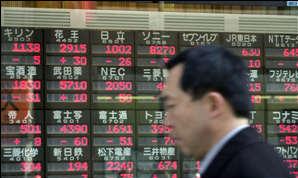Worries
Investors seek refuge as credit worries snowball
 Global investors slashed exposure to risk on Thursday, driving key stock benchmarks to multi-year lows and setting the yen soaring as traders exited high yielding assets and opted for the safety of government bonds and cash.
Global investors slashed exposure to risk on Thursday, driving key stock benchmarks to multi-year lows and setting the yen soaring as traders exited high yielding assets and opted for the safety of government bonds and cash.
Some measures of risk aversion reached their highest level since the September 11 2001 attacks as fears grew that fallout from the U.S. mortgage market could spark a funding crisis for financial institutions and companies worldwide.
"The effects from U.S. credit on global markets remains consistent with a textbook case unraveling of financial contagion," Lena Komileva, London-based G7 economist at broker Tullet Prebon said in a note to clients.
The FTSEurofirst 300 index of European stocks shed 3 percent by midday after MSCI's measure of Asia Pacific stocks outside Japan suffered its worst percentage drop in six years.
U.S. stock futures indicated steep declines in store when Wall Street opens after a Federal Reserve official downplayed the need for an interest rate cut to restore calm to financial markets and beleaguered mortgage lender Countrywide Financial Corp. said it would draw down all of an $11.5 billion credit line to fund its lending operations.
The yen soared as the credit-fuelled tumult triggered a dramatic acceleration of the carry trade unwind, pushing the dollar below the psychologically key 115.00 yen level for the first time in a year.
"There's a perception from the investor community that this (carry unwind) is a little bit more entrenched than the last bout of significant carry unwind in February. This is a broad based concern about the state of the global financial system," Bank of America currency strategist Kamal Sharma said.
CREDIT SPREADS GAPE
The iTraxx Crossover index, the most watched indicator of European credit sentiment, jumped sharply wider to hit the 400 basis points mark for the first time in 10 days.
Meanwhile two-year euro zone government bond yields shed as many as 15 basis points to trade below 3.90 percent for the first time since early March -- beneath the key European Central Bank policy rate of 4 percent.
"Credit market conditions are now analogous to a secondary banking crisis. Equity markets have moved to signal a global economic slowdown, driven by a worsening financial crisis. The equity markets appear to be expecting a much worse outcome for credit than the credit markets themselves are discounting," Tim Bond, the head of asset allocation at Barclays Capital said.
The widening array of credit market losses has rattled investors, even hitting the confidence of banks lending to each other, prompting hefty injections of cash by central banks in the past week to relieve a money market squeeze.
The U.S. Federal Reserve said on Thursday it would be ready for further operations as needed to facilitate trading of federal funds near its 5.25 percent target rate.
The ECB had announced no plans to inject extra funds into euro zone money markets by 1259 GMT, staying on the sidelines for a second day running and Asian central banks were largely absent from the market.
YEN SURGE
The surge in the yen -- the Australian and New Zealand dollars were on track for their steepest daily decline against the yen in 20 years -- as options barriers were smashed and automatic sell orders were triggered set off some market talk that the Bank of Japan might step in.
A UK representative of the BOJ declined to comment on the yen's leap. The last time Japan intervened was March 2004.
Investors dashed for liquidity and bailed out of risk positions across all markets.
"It's orderly panic in credit. The crux of all this is the financials which are getting beaten. There's massive illiquidity which is reflected in bid-offer spreads for bonds," said a European corporate bond trader.
Financial stocks led the 3 percent share market fall in Europe, though miners also took a beating as some investors fretted about the economic implications of the market turmoil.
The falls in major markets intensified selling in emerging market assets. Emerging equities tracked by MSCI sank 4.5 percent to a 3-1/2 month low, while the EMBI Plus showed emerging debt spreads widening 8 basis points to 230 bps over Treasuries. The index has added 24 bps over three sessions.
Gold fell to trade at $664.20/664.80 an ounce by 9:02 a.m. EDT, down from $668.80/669.40 in New York late on Wednesday.
U.S. crude oil dropped $2 to $71.30 as the credit fears pounded global financial markets and as a storm threat to U.S. Gulf refineries and rigs receded.
(Published by Reuters, August 16, 2007)
_________________________